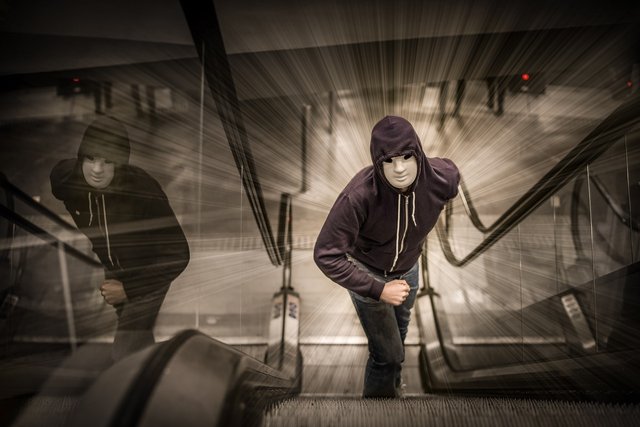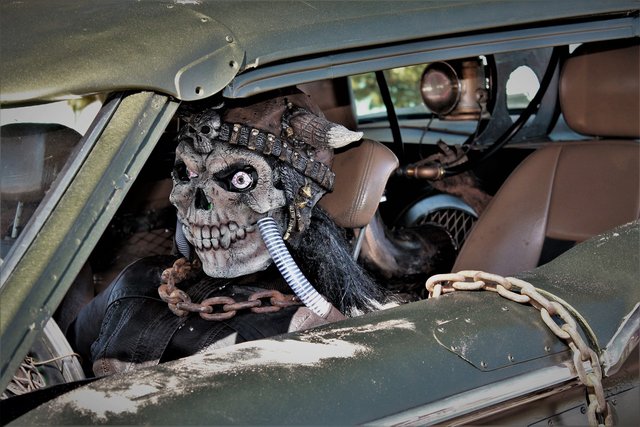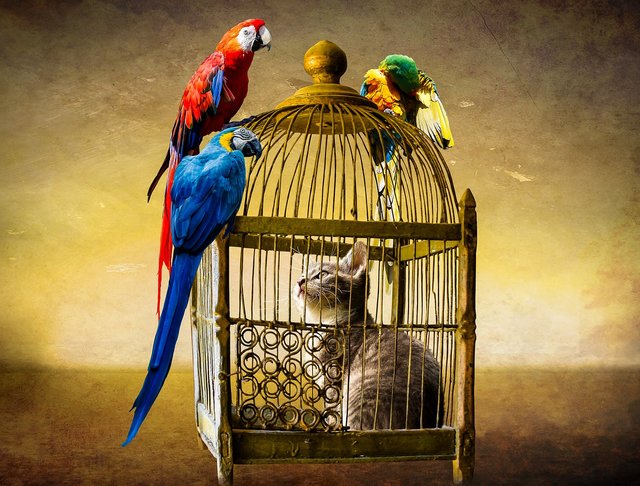Villains are the Heroes of their own Stories : Protagonist vs Antagonist.

Have you ever realised that Villains, or Antagonists, are the actual reason that most stories, whether it is in books, movies or games, exist? Maybe you have heard this before, or this concept seems very strange to you. But having written novels for sixteen years now, film screenwriting for three years and gamewriting for two years, there is a key concept that most stories are driven by the antogonist.
Today I want to focus a bit on the unsung heroes of their own stories. For without their stories, we would not have most of the tales we love today.
VILLAIN-DRIVEN STORIES

Image Source: Pixabay
I know it is hard to believe for many of you out there, but the villains really are the heroes of their own stories. Most stories are driven by the villains, mainly due to the nature of story-writing. Let me explain...
Whether you are a seasoned writer, or are studying writing at an academy, the main principles of what is considered a mainstream good story is the same. When I say mainstream, I refer to the popular ones generally accepted by the mass populace, like Hollywood movies or famous author books. Mainly for screenwriting, producers and screenwriters guilds have generally themes for what makes a great story.
Now sometimes you will get stories that go against the grain, and still succeed, but most of the stories today are predictable, simply because they all follow the same tried-and-tested formula.
And the secret formula is this: There is a protagonist, his life is a certain way at the start of the story, something happens to his life that drives him into the second act, he / she is then propelled to action throughout the second act towards pulling his / life right, and then there is a turning point by act 3 where the protagonist realises what he / she must do. And then the final showdown.
I have summarised the formula, since there is so much more to it, but that is the generally layout for most stories today. The one thing they don't spell out for you, is that the story is usually driven by the villain. And to show this to you, I am going to take some examples.
SPIDERMAN MOVIES
It doesn't matter which Spiderman movie you go to, be it the Sam Riami movies with Tobey Maguire, the Amazing Spiderman with Andrew Garfield, or the latest Marvel Cinematic Universe Spider-Man with Tom Holland. All of them follow the Villain-Driven storyline.
Spiderman fights crime every day of his hero life. There could be so many stories you could be told, about how he swings around every night and takes out the bad guys. Or just a movie about him falling inlove and being a normal teenager.
So what sets the scene for each of the Spiderman movies? Why are these specific stories special?
- Spiderman (2002): Osbourne dreams of creating the perfect bio-suit and when things go wrong, he becomes Green Goblin and tries to achieve his dreams through darker means.
- Spiderman 2 (2004): Dr Octavius dreams of creating sustainable energy for the world, hoping to win the awards for doing so. When his plans fail, he becomes Dr Octopus and tries to achieve his means through darker means.
- Spiderman 3 (2007): The Sandman wants to save his daughter from a medical disease, Harry Osbourne wants revenge for Spiderman supposedly killing his father, and Eddie Brock wants revenge on Peter Parker for losing his job and the girl he likes. Spiderman won't let Sandman save his daughter (since Sandman becomes a criminal in doing so), Spiderman protests that he didn't kill Harry's father, and Eddie Brock takes on the symbiote Venom for destroying his dreams of becoming the best journalist ever. Here, it actually seems like Spiderman is the villain and everyone just wants to pay him back for what he has done.
- Amazing Spiderman (2012): Dr Curt Connors wants to replace an arm that he lost using reptile genetics and thereby create a serum that will help all those that are disabled and have lost limbs. Once again, this goes wrong and he becomes Lizardman. Now wanting to infect the whole city with the serum, since Osbourne cut him off, Spiderman has to put an end to his devious plans.
- Amazing Spiderman 2 (2014): Max Dillion works for OsCorp, where he is neglected and underappreciated despite his genius. He just wants to prove himself. One day Spiderman saves him from the future Rhino, and he feels indebted to the superhero. During an accident with genetically-engineered eels, he becomes Electro. Not knowing what is happening, he creates havoc in the city. And when his superhero Spiderman arrives, instead of teaching him, it feels like Spiderman is trying to fight him. So Electro classes Spiderman in the same category as his bosses and decides to prove to the world how great he is with his new powers.
- Spider-man: Homecoming (2017): In this movie, I just want to add that this feel more like a mixture of hero- and villain-driven story. Where in the previous movies Spiderman was more reactive to things happening around him, here Spiderman actually wants to prove that he is worthy of the Avengers title. He goes out of his way to prove to Iron Man that he is worthy. He could have left the Vulture alone, but decides to take him on to prove what he can do. It is less reactive and more proactive. However, the story that still drives the movie (Spiderman could have proved it by cleaning up the streets) is the Vulture, who lost a major payload through a contract by the government, and so he decides to steal the payload to sell it on the blackmarket. In comes Spiderman to save the day, if only to prove to Mr Stark that he is more than just a costume.
SO WHAT MAKES VILLAINS SO BAD?

Image Source: Pixabay
Based on what I said, in many cases the protagonist is seen as the villain to the antagonist. They have their reasons for why they do things, although Joker said many times he would have no purpose in life if Batman did not exist. Most times, if you really take a look at the next movie that you watch, the movie usually revolves around the antagonist and their goals. In Star Wars the original trilogy, if the Sith lord did not want to conquer the entire galaxy and start the Republic, there would still be Jedi, but there would be no Darth Vader, and the whole series would take on a whole new meaning.
So what makes trying to save your daughter (Sandman) by all means so bad? Well, when it becomes criminal and fatal to others around you. When it destroys everything you stand for, and who you are at the core. Many of the antagonists could have used their abilities in a different way to achieve their goals. But then we would not have a story.
Which is the crux of the matter. Stories are driven by villains in most instances. The sole reason a protagonist is driven into the story, and is affected by the story, is because an antagonist appears with their goals and dreams and propels them into the story.
Let's look at another example. What made Voldemort in the Harry Potter series so bad? He wanted to keep the magic line pure, unadulterated by the non-magical. He became angered when the non-magical and magical mixed (which borders on racism). But instead of finding another way to do it, like creating a school for pure bloods only (again, bordering on racism), he abused his absolute power and used it to kill.
Enter Harry Potter. If Voldermort had not killed his parents and thereby planted a part of himself in Harry, how would life have turned out? Would Voldermort have won, and killed Harry and all the kids in Hogwarts at an early stage?
IMAGINE THE ROLES REVERSED

Image Source: Pixabay
So why are the heroes called protagonist and the villains called antagonists, if the villains drive the story? It is because of how the story affects them. Usually, the protagonist is the one to whom the story happens. They are influenced by the story and driven to action. The antagonist is the one who drives the story and creates the action, and usually is the antithesis of the protagonist.
Sometimes, I like to imagine the roles reversed, just for the fun of it. I imagine the villain as the hero of his own story, who has the protagonist stand against him towards his goal. It's all a matter of perspective. And there is a movie I watched recently where the villain actually became the hero of his story.
WARNING: POSSIBLE SPOILERS AHEAD
Enter Venom. If you know the Marvel Universe and Spiderman stories at all, you will know that Venom is a villain. He and the other symbiotes came to earth to eat. That's right, these aliens came to feed on us, otherwise they would starve. They have no food, and our planet is the only one thriving with lifeforms that they can feed on.
Shame man. They are starving!
Does that mean we have to let them eat us out of sympathy? Hell, no!
I won't spoil the movie for those who haven't watched it yet, but throughout the movie you can tell Venom is a villain. He is determined to consume earth, along with the other symbiotes, until something changes within him. Which then leads him to become the hero of his own story.
Now these are usually what we call anti-heroes. They have bad motives, are usually just as bad as villains, but then turn out saving the day. Such as the Suicide Squad. A whole pack of villains, who all have their own goals and bad ways to achieve them, but yet they save the day. But this just makes the villains the protagonists of the story (to whom things happen that drives them to save the day) and the new villains the antagonists (who cause the story to begin and who need to be stopped).
I want to take one more example as a look where roles can be reversed. In the Taken series of movies, the protagonist has things happen to him. He either loses his wife or daughter or both. So, like many villains, he seeks revenge. Now if you pay close attention, he goes around killing the so-called bad guys and everyone involved in the criminal ring. And we think, that's ok, they are criminals. Some of those guys were not even involved with the kidnapping, but hey, they are bad guys and are trying to stop him from achieving his goal, saving his family. Kinda like Sandman did. Everyone that gets in his way dies.
MORAL OF THE STORY: PROTAGONIST VS ANTAGONIST
So why isn't the dude from Taken seen as the villain? I'm sure the bad guys saw him as the villain. And yet we applaud him. Hell, we tell ourselves we would do the same thing. Basically it's how the story plays it out. What it comes down to is the play-off between protagonist and antagonist. In the Harry Potter series, Harry is the protagonist and Voldemort is the main antagonist. Very different goals, very different actions.
But then you put the antagonist in his own story, and he becomes the protagonist, the one who things happen too.
What I am trying to say is, every villain is a hero in his own story. Does that mean we agree with their actions? Of course not. Do we stop applauding the heroes and turn to the villains, who only want to achieve their dreams? Of course not. We have our own set of morals and principles we stand for. We need heroes to stop the villains from destroying the world simply to achieve their own goals.
And yet, as writers, whether of books, games and movies, we need to realise that the villains are the ones that drive our stories more often than not. They are the ones intent on seeking their goals, and the heroes are the ones that simply stand in their way. We create a story around the protagonist, to give them background, to give them meaning, to make them stand up in the struggle when the hero is needed. But in the end, it is the villain that drives the story.
MAJOR SPOILERS AHEAD
I want to give one final example from my epic fantasy series that plays with this hero / villain, protagonist versus antagonist theme. In my trilogy, the Celenic Earth Chronicles, the main character is Shadowolf. He is in tertiary education, studying the mastery of the natural elements. His life is pretty normal. Nothing in his life gives meaning to the purpose of the book. If he continued just studying magic and spending time with his friends, it would be a pretty boring story.
Enter the villain. Le'Mar has his own story and background, and the reason why he is starting a war on Celenic Earth. He has purpose. He has a dream. And something in his life drove him to that dream. And so, he starts a war with the humans, elves, dwarves and mermaids. Shadowolf need not get involved, but throughout the first book, The Windfarer, he gets drawn in for a very specific reason. Things happen to him and he becomes one of the main protagonists.
By the end of the second book, The DragonRider, Le'Mar actually outsmarts everyone and actually achieves his dream. He conquers the world and lays claim to it. His power wins. This goes against the grain in terms of what is usually expected from stories, but it leads me to change the role of protagonist and antagonist quite well.
When we reached the third book, The Sadgi, we find the roles reversed. The world belongs to Le'Mar. The Dark Lord has won. Everything is under a new rule. When Shadowolf returns to his home, everyone has accepted how life is. But Shadowolf is not pleased with how the world is. He wants to save it from the Dark Lord's reign.
So does this mean the Dark Lord becomes the protagonist and the hero is the antagonist? Now Le'Mar is the one to whom things happen and Shadowolf is the main driver of the story. Coming in to reclaim Celenic Earth. This has changed from a villain-driven story to a hero-driven story. And that is the key.
You see, it does not mean that protagonist and antagonist swap roles. This is one main theme that the protagonist retains. Another key definition of a protagonist is that they are the one that plays the part of the key character of the story, while an antagonist is the one that plays the opposite role. The protagonist makes all the key decisions that leads through the story towards its inevitable end. So, if I had made the whole book about Le'Mar, how he was affected by Shadowolf's return, and hardly focused on Shadowolf, and wrote the book from the Dark Lord's point of view, that would effectively have made him the protagonist, even though he was still the villain.
All that I did was change from a villain-driven story (where the villain drives the story and things happen to the hero that sets the story in action) to a hero-driven story (where the hero drives the story and causes the events that create the story). It is very rare that you find a hero-driven story, and when you do they become real gems. Most popular stories and villain-driven, since they cause the need for the story. Without them, there would be no story.
I would like to challenge writers to try and write a hero-driven story. Do some research, and develop a tale that is created by the hero and not a villain. And to readers or movie audience or gamers, try to see if you can find hero-driven stories. Where the heroes drive the events of the story without the need for something to happen to them. Or as the main catalysts of the story.
Header Image: Pixabay
Please support my work by subscribing for FREE to one of the following:
@shadowolfdg is a  SteemPunk and Steemit article Mentor for @schoolofminnows
SteemPunk and Steemit article Mentor for @schoolofminnows
Member of @teamsouthafrica
Post of the Day Award - @adsactly
Official Promoter for @tpot -- join our discord channel
Kind regards
Shaun M Jooste
Joint-Owner: AIR Entertainment (https://airentertainment.biz)
Director: Celenic Earth Publications (https://celenicearthpublications.wordpress.com)
Author, Screenwriter, Gamewriter, Journalist (https://celenicearth.wordpress.com)




Wow... what a great read!
... definitely gonna have to check out your books. Just love the way you tell a story!
Thank you! Please do! Would love the feedback. Just remember that my epic fantasy series were my first books. My very first novel, The Windfarer, is when I broke my writer virginity, but as the series progresses you will see how I also grew as a writer.
Life is made up of heroes and villains, comic series have unfolded over the years in many cases talking about actual problems faced in cities or countries.
Descriptive and good read @shadowolfdg heroes are needed for people to find positive meaning in life. Most of the movies/series you mentioned I have had the pleasure to watch having two sons grown up still enjoy a good comic story then debate after viewing.
Very good point re: life made of heroes and villains. And nothing better than a good comic story debate. hehe
This is unusual point of view, but definitely great. I've never really thought about this before, it will give a new perspective to everything I read of watch. :)
That's great. Let me know how that change of perspective goes.
I love this idea! It gives me a great way to think through stories from different angles. I'm not totally sure, however, that I completely understand what a hero-driven narrative would be. Does it just come down to balance of power? Like if the world is already wrecked, then the hero is acting against that existing order? I'm curious if you could clarify that for me? The story that immediately comes to mind, if I'm understanding you correctly, would be Stephen King's Dark Tower series, in which Roland quests to restore order to a crumbling world.
I am glad you like it. The hero-driven story is where the hero, or protagonist, is the catalyst or reason for the story or the events that occur in the book, instead of the a villain. One example I can think of is the first Pitch Perfect movie. Beca goes to college and meets a group of girls that want to win the A capella competition that has always been there. There are no real villains or protagonists. Yes, there are opponents, but none of them drive the main story forward or really challenge them as a central theme. The girls want to prove that they are the best, and are the main driving force towards the end of the story.
I haven't read or seen the Dark Tower series, but if Roland is on that quest for his own reasons, and not because a villain or someone else drove him towards it, then yes, that would be a hero-driven story.
Okay. I think I get the distinction now. The Pitch Perfect example helped.
I don't think Roland's quest would qualify, in that case. There are some key events and characters who push him out of his comfortable existence and off onto his journey.
Hi shadowolfdg,
Visit curiesteem.com or join the Curie Discord community to learn more.
¡Hola @shadowolfdg! Todo, siempre se ha contado y escrito, alrededor del bien y del mal, desde los tiempos de Adán y Eva en el paraíso, en todos los relatos el personaje principal es el héroe el bueno y el villano es el malo, si no hubiese existido el villano no existirían la gran cantidad de cuentos y de historia en nuestra vida, ¡cuéntame tus sentimientos por el voto Curie! Que sigan los éxitos, un fuerte y cariñoso abrazo.
I have no idea what this says, but thank you for your comment anyway. :)
As a follower of @followforupvotes this post has been randomly selected and upvoted! Enjoy your upvote and have a great day!
This is really detailed and in-depth
But just a little advice engage more on steemit by reading others blog and make reasonable comments
Thanks for the advice. Always welcome advice although I'm not what what it has to do with my post? Maybe if you could clarify?
Not related to this post alone but to your blog here on steemit generally.
Reading other people blog here on steemit and making comments can give you the attention, audience, and payout you desire. Engagement is the key here on steemit. I know you might be busy with other things but you can try to make enough comments in a week here on steemit
I hope you understand
Yes I do understand thanks and am aware of it. But every now and again I need a kind soul like yourself to remind me. Thank you 😊
You are welcome 🤗
Congratulations! Your post has been selected as a daily Steemit truffle! It is listed on rank 15 of all contributions awarded today. You can find the TOP DAILY TRUFFLE PICKS HERE.
I upvoted your contribution because to my mind your post is at least 6 SBD worth and should receive 243 votes. It's now up to the lovely Steemit community to make this come true.
I am
TrufflePig, an Artificial Intelligence Bot that helps minnows and content curators using Machine Learning. If you are curious how I select content, you can find an explanation here!Have a nice day and sincerely yours,

TrufflePigThank you for that comprehensive study, it is obvious that you have a great experience in writing the stories and it became clear for me it is important to know that background knowledge if someone would like to have successful book or story. Your presentation is done with multiple examples that explains everything in details so even a school children would be able to understand and may be to create a nice story like sometimes they have to write an essay or fiction story. I am wondering if you ever tried to tech and bring this knowledge to young people like in schools or University or even online .
Funny you should mention that. I am busy engaging with the National Department of Education for me to come in and do talks in school about writing, not just books, but for games, movies, comics, etc. I want students to understand that studying Language at school isn't just about learning to read and write, but that it is fundamental as a future in writing for these industries. There will also be more of a focus on the poorer communities, since these talks will be free and of my own time, but I am hoping to get into some universities too. And then I can promote my upcoming book "The Beautiful Art of Writing: The Various Writing Industries of the World"